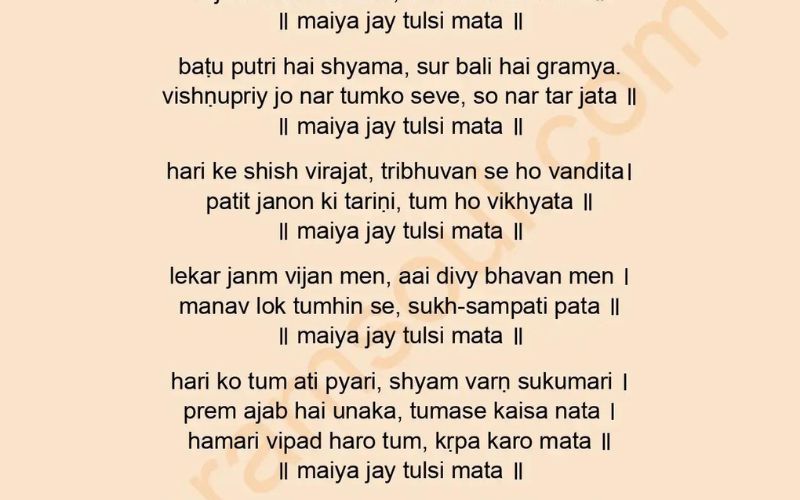In the vast realm of Indian devotional music, certain compositions hold a special place due to their lyrical beauty, melodic charm, and spiritual significance. One such composition is “Jai Tulsi Mata,” a devotional song dedicated to Goddess Tulsi. Sanjeevani Bhelande, a renowned Indian playback singer, has rendered this aarti with her melodious voice, bringing a renewed sense of devotion and reverence to the age-old tradition. This article delves into the significance of Tulsi in Hinduism, the lyrical essence of “Jai Tulsi Mata,” and Sanjeevani Bhelande’s contribution to its widespread popularity.
The Significance of Tulsi in Hinduism
Historical and Mythological Background
Tulsi, also known as Holy Basil, is not just a plant in Hindu culture but is revered as a goddess. According to Hindu mythology, Tulsi is considered a manifestation of Goddess Lakshmi, the consort of Lord Vishnu. The story of Tulsi’s origin is rooted in the tale of Vrinda, a devotee of Lord Vishnu, whose loyalty and devotion were unmatched. Vrinda was transformed into the Tulsi plant by Lord Vishnu himself, and since then, Tulsi has been worshipped as a goddess.
Tulsi’s Role in Rituals and Worship
Tulsi holds a pivotal role in various Hindu rituals and daily worship. The plant is often found in the courtyards of Hindu homes, symbolizing purity, auspiciousness, and divine protection. Devotees perform daily pujas (ritual worship) to the Tulsi plant, offering water, flowers, and reciting prayers. Tulsi leaves are considered sacred and are used in various religious ceremonies, including offerings to deities and in the preparation of prasad (sacred food).
Spiritual Benefits of Tulsi Worship
Worshipping Tulsi is believed to bring numerous spiritual benefits. It is said to purify the mind, body, and soul, fostering a sense of peace and devotion. Tulsi worship is also associated with the destruction of negative energies and the attraction of positive vibrations, thereby creating a harmonious and spiritually uplifting environment.
Jai Tulsi Mata: The Lyrical and Melodic Gem
The Lyrics: A Devotional Ode
The lyrics of “Jai Tulsi Mata” are a beautiful blend of devotion and reverence, praising the virtues and significance of Goddess Tulsi. The words are crafted to evoke a deep sense of spirituality and connection with the divine. Here is an exploration of the lyrics:
Jai Jai Tulsi Mata, Jai Jai Tulsi Mata Jai Jai Tulsi Mata, Maiya Jai Tulsi Mata
Har Dukh Door Kare, Har Dukh Door Kare Bhakt Janon Ki Sukh Data, Maiya Jai Tulsi Mata
Jai Jai Tulsi Mata, Jai Jai Tulsi Mata Jai Jai Tulsi Mata, Maiya Jai Tulsi Mata
These lines express a heartfelt invocation to Goddess Tulsi, acknowledging her divine presence and seeking her blessings to remove sorrows and bestow happiness upon her devotees.
The Melody: A Soulful Rendition
The melody of “Jai Tulsi Mata” is soothing and soulful, designed to instill a sense of tranquility and devotion in the listener. The composition employs traditional Indian musical elements, creating a harmonious blend of rhythm and melody that complements the devotional lyrics.
Sanjeevani Bhelande: The Voice Behind the Aarti
A Brief Biography
Sanjeevani Bhelande is a distinguished Indian playback singer known for her versatility and melodious voice. Born into a family with a rich musical heritage, Sanjeevani developed a deep passion for music from a young age. She trained under renowned classical musicians and made her mark in the Indian music industry with her unique vocal talent.
Contributions to Devotional Music
Sanjeevani Bhelande has significantly contributed to the genre of devotional music, rendering numerous bhajans (devotional songs) and aartis that have resonated with devotees across the globe. Her rendition of “Jai Tulsi Mata” is one such example, where her melodious voice brings the lyrics to life, creating an immersive devotional experience for the listeners.
Impact on the Popularity of “Jai Tulsi Mata”
Sanjeevani’s rendition of “Jai Tulsi Mata” has played a crucial role in popularizing this aarti among a wide audience. Her soulful singing has not only preserved the traditional essence of the aarti but also made it accessible to younger generations, thereby ensuring the continuity of this devotional practice.
The Cultural and Spiritual Impact of Jai Tulsi Mata
A Tool for Meditation and Prayer
“Jai Tulsi Mata” serves as a powerful tool for meditation and prayer, helping devotees connect with the divine presence of Goddess Tulsi. The repetitive chanting of the aarti creates a rhythmic pattern that aids in focusing the mind and fostering a deep sense of spiritual awakening.
Preservation of Cultural Heritage
The aarti “Jai Tulsi Mata” is an integral part of Hindu cultural heritage, preserving the ancient traditions and practices associated with Tulsi worship. Through her rendition, Sanjeevani Bhelande has contributed to the preservation and propagation of this cultural treasure, ensuring that it continues to inspire and uplift future generations.
A Symbol of Devotion and Faith
The widespread popularity of “Jai Tulsi Mata” underscores its significance as a symbol of devotion and faith. It serves as a reminder of the timeless values of purity, devotion, and divine grace that are central to Hindu spirituality.
Conclusion
“Jai Tulsi Mata” is more than just a devotional song; it is a spiritual experience that transcends the barriers of time and space. Through her enchanting rendition, Sanjeevani Bhelande has breathed new life into this age-old aarti, making it a cherished part of the devotional repertoire for millions of devotees. The significance of Tulsi in Hinduism, coupled with the lyrical beauty and melodic charm of “Jai Tulsi Mata,” makes it a timeless ode to the divine mother, inspiring devotion and reverence in the hearts of all who listen.





